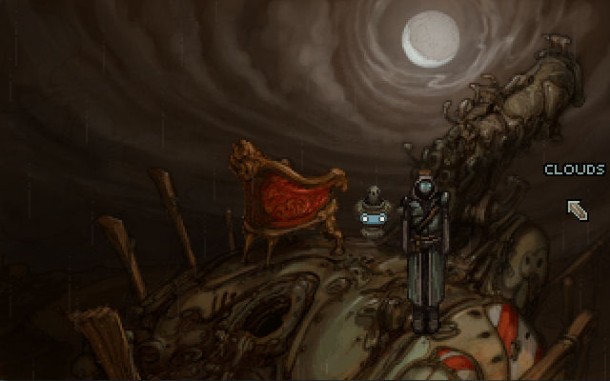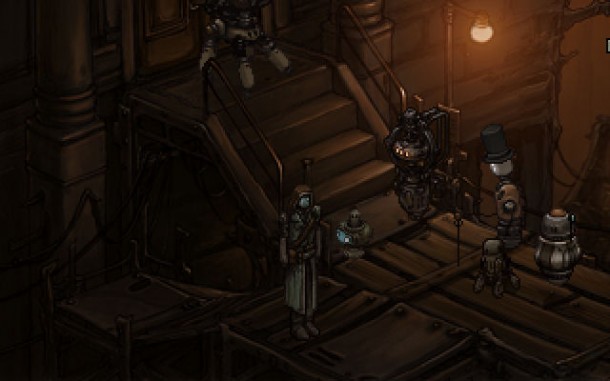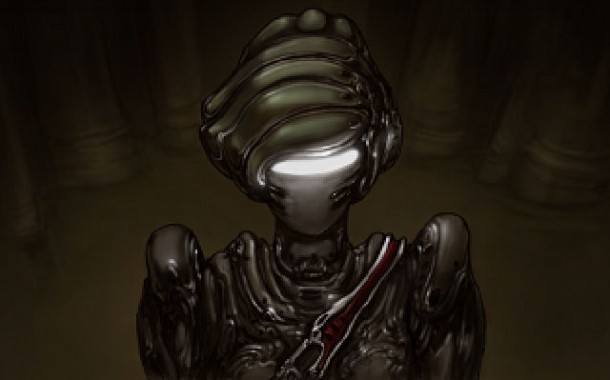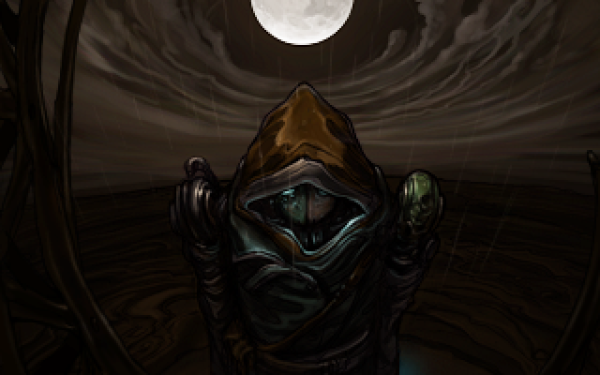 Primordia is a world worth exploring. It’s dense; it’s intricate; and it’s mysterious all at the same time. It’s the perfect place to set an adventure game.
Primordia is a world worth exploring. It’s dense; it’s intricate; and it’s mysterious all at the same time. It’s the perfect place to set an adventure game.
What can be found in that world is just as interesting. Primordia focuses on complex topics like creationism vs. evolutionism, progressivism vs. conservatism, creation vs. creator.
But Primordia’s greatest flaw is its simplicity. There’s no nuance to what it discusses. It reduces them to binary choices, and shies away from reflecting your input. It’s rudimentary compared to the story it’s trying to tell, and the robots that inhabit it.
Like previous Wadjet Eye releases, Primordia is an adventure game, notepad and logic required.
Horatio and his pet bot Crispin are robotic scavengers who live alone, outside of the city of Metropol. They live off of the junk left by man, who they praise as the “perfect machine”, rummaging through the rust and soot. The crystal powering their ship — and home — is taken by another robot, and they’re forced to search for another power source. They’re strangers outside of their comfort zone, with the tools to fix the bigger problems in Metropol.  Mechanically, it’s humble. You’ll search for, combine, and trade items scattered around the environment to move the story forward. Once you’ve found a solution, implementing it is frictionless. In case you’re not a quick note-taker, pertinent information is stored in Horatio’s data pouch for quick access, and travel time is cut short with a map that allows you to teleport to specific locations.
Mechanically, it’s humble. You’ll search for, combine, and trade items scattered around the environment to move the story forward. Once you’ve found a solution, implementing it is frictionless. In case you’re not a quick note-taker, pertinent information is stored in Horatio’s data pouch for quick access, and travel time is cut short with a map that allows you to teleport to specific locations.
Primordia’s world makes you feel small. It’s one that lives and breathes on its own, and it’s clear Horatio and Crispin’s story is only one snapshot of it. You’ll find artifacts of man that suggest much more is going on than it can address in the short time you spend with it. Primordia’s scenes tell a story separate from Horatio and Crispin’s. There’s a moment when you come upon a skeleton of a man, and Horatio shrugs it off as a primitive android. You want to tell him he’s looking at the very thing he worships, but you can’t. AA guns, tanks, and blast craters suggest a war caused man’s extinction. The tinge of mystery makes you curious, and eager to what else the world is hiding.
It’s hard to describe Primordia’s take on a post-apocalyptic Earth as fresh, but its dilapidated look is distinct. Browns and oranges are the subjects of complaint for most modern games, but here they’re used in conjunction with pockets of lights, and remnants of mankind. It feels desolate and warm at the same time.
Occasionally, Primordia’s dense environments work against you.
The problem is in the detail. It’s hard to discern what’s clickable and not. More often than I liked, I couldn’t solve a puzzle because I was missing a certain item. I would repeatedly talk to Crispin in hopes he would choose the hint sentence in his random cycle of dialogue. Once you’ve talked to him a few times, you’ve heard all that he has to say outside of the story-triggered comments, and it can be a pain to wait for what you need. Pixel-hunting is the bane of every adventure game, and at times Primordia sinks to that level.
When you’re not painstakingly scouring the environment, Horatio and his pet bot Crispin give you something to chew on. It’s a relationship you’ve seen before: a wise-cracking sidekick and his serious partner. What’s interesting is their take on the end of the world, the way they treat it like a monotonous day job, ignoring the significance of what they find. They never get a chance to dig into their past before the game drags you through a dull middle chapter in Metropol. Suddenly, the game’s pacing lurches ahead as it dumps a load of exposition on you. It’s becomes a mad rush to explain everything before it ends, and it does a disservice to its characters.  Metropol is where Primordia struggles to keep its narrative consistent. It asks you to take a stand on the game’s larger themes that conflict with Horatio’s character. Horatio isn’t a blank slate, and to force him into an opinion that doesn’t fit with his ideals, diminishes the character as he was written. What’s worse, the game doesn’t reflect your choice other than with an alternate item to finish a puzzle. The way the choices are presented in an A-or-B format makes them feel contrived, and leave the game’s intention unclear.
Metropol is where Primordia struggles to keep its narrative consistent. It asks you to take a stand on the game’s larger themes that conflict with Horatio’s character. Horatio isn’t a blank slate, and to force him into an opinion that doesn’t fit with his ideals, diminishes the character as he was written. What’s worse, the game doesn’t reflect your choice other than with an alternate item to finish a puzzle. The way the choices are presented in an A-or-B format makes them feel contrived, and leave the game’s intention unclear.
Primordia doesn’t follow through with what it sets up. You think it’s going one way in the first few hours, just before it shifts, and deserts its main characters. It’s a move that weakens their purpose, and warps the game’s pacing. It falls apart as it tries to tackle the larger problems it introduces, and it makes a ham-fisted attempt to tie in your actions into the conclusion. It’s a shame, because the world is worth returning to. There’s room for more stories to tell, ones that might support your input, and take a stand where Primordia can’t.
This review is based on review code sent to SideQuesting by the publisher.



No Comments